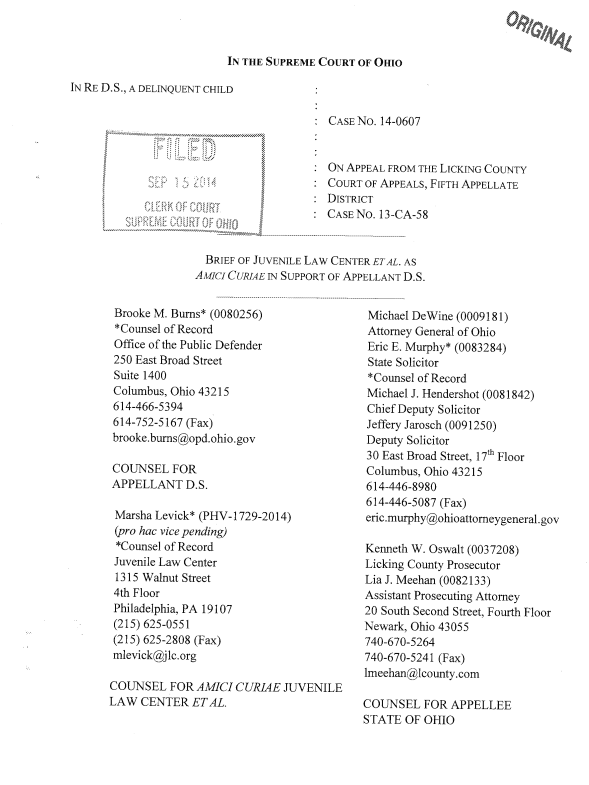
Summary of Argument
Amici respectfully submit this brief for the purpose of expanding upon Appellant's Third Proposition Of Law, "The Imposition of a Punitive Sanction That Extends Beyond the Age Jurisdiction of the Juvenile Court Violates the Due Process Clauses of the United States and Ohio Constitutions." Accordingly, we ask that this Court hold S.B. 10 unconstitutional as applied to children.
With the adoption of 2007 Am. Sub. Senate Bill 10 (S.B. 10), Ohio now registers many children as sex offenders for longer than these children will have even been alive. Some children as young as fourteen years old with no previous delinquent offenses are subject to twenty-year registration with attendant onerous reporting requirements. This registration scheme violates state and federal constitutional due process protections because it is inconsistent with the special protections the United States Supreme Court has held must be afforded children. See, e.g., Roper v. Simmons, 543 U.S. 551 (2005); Graham v. Florida, 560 U.S. 48 (2010); J.D.B. v North Carolina, 131 S. Ct. 2394 (2011); Miller v. Alabama, 132 S. Ct. 2455 (2012).
Ohio has long treated children differently than adults and prioritized rehabilitation over punishment. Towards that end, Ohio shields children from adult consequences, such as criminal stigma, so that children may become productive members of society. Because of the rehabilitative aims of the juvenile court, juvenile offenders are not offered the full panoply of procedural rights that adult criminal defendants receive. They lack, for example, the right to trial by jury. Yet D.S. faces serious adult consequences, including decades of registration and a risk of lifelong stigmatization. As a result, D.S., and others in his position, receive "the worst of both worlds" In re Gault, 387 U.S. 1, 18 n.23 (1967).
This Court has never addressed the question of whether sex offender registration violates a child's fundamental reputation right as protected by the Due Course clause of the Ohio Constitution. 1 In light of the protective approach courts must take when applying constitutional standards to children, Roper, 543 U.S. at 551; Graham, 560 U.S. at 48; JD.B., 131 S. Ct. at 2394; Miller, 132 S. Ct. at 2455, the explicit reference to reputation in the Ohio Constitution's Due Course clause, which is Ohio's analog to the federal due process clause, and the historical treatment of reputation in Ohio and other states, children have a fundamental right to reputation. Thus, the registration requirements can only stand if they are narrowly tailored to serve a compelling state interest. They do not meet this standard. Indeed, research shows that registration of juvenile offenders neither improves public safety nor rehabilitates youth.
The 2006 federal Adam Walsh Child Protection and Safety Act, Pub. L. No. 109-248, 120 Stat. 587-the impetus for S.B. 10-provides that state courts may evaluate the constitutionality of their individual registration schemes. 42 U.S.C. § 16925. Upon determination that the scheme is in violation of constitutional law, it may be stricken without jeopardizing the state's federal financial benefits. 42 U.S.C. § 16925. Requiring D.S. and other similarly situated children to register for up to twenty years violates both the Ohio and United States Constitutions.